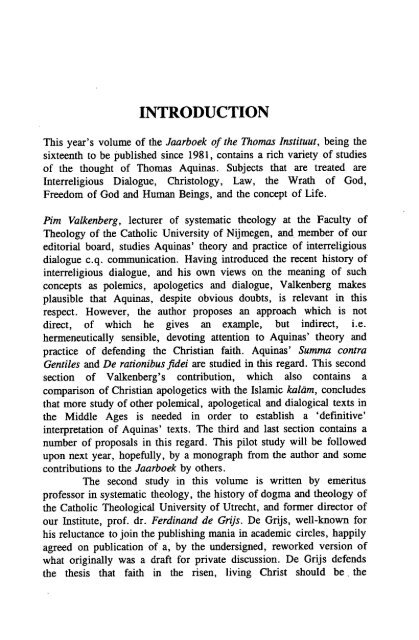Jaarboek Thomas Instituut 1997 - Thomas Instituut te Utrecht
Jaarboek Thomas Instituut 1997 - Thomas Instituut te Utrecht
Jaarboek Thomas Instituut 1997 - Thomas Instituut te Utrecht
You also want an ePaper? Increase the reach of your titles
YUMPU automatically turns print PDFs into web optimized ePapers that Google loves.
INTRODUCTION<br />
This year's volume of the <strong>Jaarboek</strong> of the <strong>Thomas</strong> <strong>Instituut</strong>, being the<br />
six<strong>te</strong>enth to be published since 1981, contains a rich variety of studies<br />
of the thought of <strong>Thomas</strong> Aquinas. Subjects that are trea<strong>te</strong>d are<br />
In<strong>te</strong>rreligious Dialogue, Christology, Law, the Wrath of God,<br />
Freedom of God and Human Beings, and the concept of Life.<br />
Pim Valkenberg, lecturer of sys<strong>te</strong>matic theology at the Faculty of<br />
Theology of the Catholic University of Nijmegen, and. member of our<br />
editorial board, studies Aquinas' theory and practice of in<strong>te</strong>rreligious<br />
dialogue c.q. communication. Having introduced the recent history of<br />
in<strong>te</strong>rreligious dialogue, and his own views on the meaning of such<br />
concepts as polemics, apologetics and dialogue, Valkenberg makes<br />
plausible that Aquinas, despi<strong>te</strong> obvious doubts, is relevant in this<br />
respect. However, the author proposes an approach which is not<br />
direct, of which he gives an example, but indirect, i.e.<br />
hermeneutically sensible, devoting at<strong>te</strong>ntion to Aquinas' theory and<br />
practice of defending the Christian faith. Aquinas' Summa contra<br />
Gentiles and De rationibus fidei are studied in this regard. This second<br />
section of Valkenberg's contribution, which also contains a<br />
comparison of Christian apologetics with the Islamic kalûm, concludes<br />
that more study of other polemical, apologetical and dialogical <strong>te</strong>xts in<br />
the Middle Ages is needed in order to establish a 'definitive'<br />
in<strong>te</strong>rpretation of Aquinas' <strong>te</strong>xts. The third and last section contains a<br />
number of proposals in this regard. This pilot study will be followed<br />
upon next year, hopefully, by a monograph from the author and some<br />
contributions to the <strong>Jaarboek</strong> by others.<br />
The second study in this volume is writ<strong>te</strong>n by emeritus<br />
professor in sys<strong>te</strong>matic theology, the history of dogma and theology of<br />
the Catholic Theological University of <strong>Utrecht</strong>, and former director of<br />
our Institu<strong>te</strong>, prof. dr. Ferdinand de Grijs. De Grijs, well-known for<br />
his reluctance to join the publishing mania in academic circles, happily<br />
agreed on publication of a, by the undersigned, reworked version of<br />
what originally was a draft for priva<strong>te</strong> discussion. De Grijs defends<br />
the thesis that faith in the risen, living Christ should be. the








